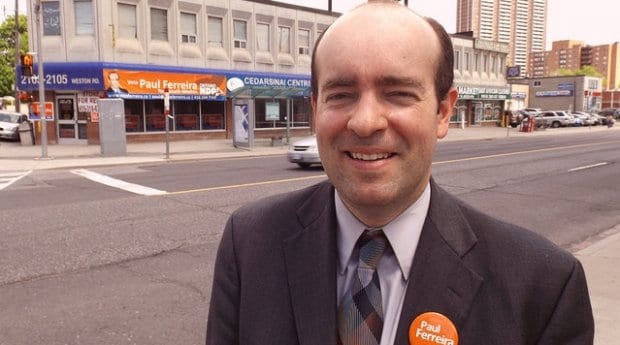A record number of openly gay, lesbian and bisexual candidates will be on the ballot in the Ontario election June 12, representing all four major parties.
Up for reelection is Liberal Premier Kathleen Wynne, who assumed office last year after Dalton McGuinty resigned. Wynne is already the first openly gay or lesbian person to hold a premiership in Canada. If the Liberals win, she’ll also be the first to win the position in a general election. She’s running in the North Toronto riding of Don Valley West.
Also up for reelection is Transportation Minister Glen Murray, who has represented Toronto Centre since winning a by-election in 2010. This is Murray’s third campaign in four years, but he’s not taking the election for granted.
Murray says that there’s still work to be done on queer rights in Ontario but that what’s important is that political parties as a whole stand for equality.
“What you’re experiencing in central Toronto is not what you’re experiencing in large parts of the community,” he says. “I don’t think the body count of gay and lesbian people in a party is what’s consequential. What are the fundamental guts of what you believe in about human rights, and are you continuing to stand up for other people?”
The gay candidate with perhaps the best hope of joining the incumbents in Queen’s Park is one who’s been there before: NDP candidate Paul Ferreira is staging a comeback in York South–Weston, the riding he briefly represented after winning a by-election in 2007. Since then, the riding’s been a battle between the NDP and the Liberals, with the Liberals carrying it by fewer than 800 votes in 2011.
“People remember me for that,” Ferreira says. “It’s great when you knock on the door and people say, ‘Paul, I voted for you last time, and you’ve got me voting for you again this time.’
“It’s a dogfight out there,” he says. “You’re competing for every vote. I expect it will be another nail biter.”
Ferreira says he spends 15 hours a day knocking on doors, and he’s lost six pounds in the first two weeks of campaigning. On that score, he’s got a ways to catch up to Glen Murray, who says he’s shed 70 pounds since giving up his car and taking up cycling last year.
Also seeking a political comeback is Progressive Conservative Phil Gillies, a cabinet minister in Frank Miller’s government who’s been out of office since 1987. Gillies is in a close race against the Liberal incumbent in Brant. Two other gay men, Jamie Ellerton and Martin Forget, are running for the PCs in Parkdale–High Park and Ottawa-Vanier.
While Gillies says he’s been working to raise more awareness about queer issues in the PC Party since helping to pass Ontario’s first gay rights bill in 1986, Murray questions how effectively he persuaded his caucus mates during his previous term in office.
The NDP is also fielding three other gay candidates in this election: ESL teacher Alexander Brown is running in Willowdale, where he ran in 2011; small-business owner and IT professional David Bradbury is running in Barrie; and local volunteer Jessie Macaulay is carrying the party’s banner in Scarborough Southwest.
The Green Party is fielding three openly gay candidates this time around. Mark Daye and Donna Cridland are returning to vie for Toronto Centre and Welland respectively, while Wil Sorrell is seeking the nod in London-Fanshawe.
The Green Party is the only party that has committed to eliminating Ontario’s public Catholic school system.
“My number-one issue is merging the school boards,” Daye says. “We can save $1.5 to $2 billion per year in merging the school boards. But the big issue for me isn’t the money; it’s the human rights issues that come to the fore.”


 Why you can trust Xtra
Why you can trust Xtra


